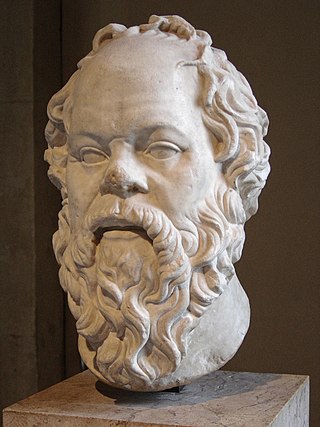First-order logic—also known as predicate logic, quantificational logic, and first-order predicate calculus—is a collection of formal systems used in mathematics, philosophy, linguistics, and computer science. First-order logic uses quantified variables over non-logical objects, and allows the use of sentences that contain variables, so that rather than propositions such as "Socrates is a man", one can have expressions in the form "there exists x such that x is Socrates and x is a man", where "there exists" is a quantifier, while x is a variable. This distinguishes it from propositional logic, which does not use quantifiers or relations; in this sense, propositional logic is the foundation of first-order logic.
Logic programming is a programming paradigm which is largely based on formal logic. Any program written in a logic programming language is a set of sentences in logical form, expressing facts and rules about some problem domain. Major logic programming language families include Prolog, answer set programming (ASP) and Datalog. In all of these languages, rules are written in the form of clauses:

A logic gate is an idealized or physical device that performs a Boolean function, a logical operation performed on one or more binary inputs that produces a single binary output.
Mathematical logic is the study of formal logic within mathematics. Major subareas include model theory, proof theory, set theory, and recursion theory. Research in mathematical logic commonly addresses the mathematical properties of formal systems of logic such as their expressive or deductive power. However, it can also include uses of logic to characterize correct mathematical reasoning or to establish foundations of mathematics.

A programmable logic controller (PLC) or programmable controller is an industrial computer that has been ruggedized and adapted for the control of manufacturing processes, such as assembly lines, machines, robotic devices, or any activity that requires high reliability, ease of programming, and process fault diagnosis. Dick Morley is considered as the father of PLC as he had invented the first PLC, the Modicon 084, for General Motors in 1968.

Willard Van Orman Quine was an American philosopher and logician in the analytic tradition, recognized as "one of the most influential philosophers of the twentieth century". From 1930 until his death 70 years later, Quine was continually affiliated with Harvard University in one way or another, first as a student, then as a professor. He filled the Edgar Pierce Chair of Philosophy at Harvard from 1956 to 1978.

Digital electronics is a field of electronics involving the study of digital signals and the engineering of devices that use or produce them. This is in contrast to analog electronics and analog signals.

A syllogism is a kind of logical argument that applies deductive reasoning to arrive at a conclusion based on two propositions that are asserted or assumed to be true.
Fuzzy logic is a form of many-valued logic in which the truth value of variables may be any real number between 0 and 1. It is employed to handle the concept of partial truth, where the truth value may range between completely true and completely false. By contrast, in Boolean logic, the truth values of variables may only be the integer values 0 or 1.
Classical logic is the intensively studied and most widely used class of deductive logic. Classical logic has had much influence on analytic philosophy.
A proposition is a central concept in semantics, logic, philosophy of language and related fields, often characterized as the primary bearer of truth or falsity. Propositions are also often characterized as being the kind of thing that declarative sentences denote. For instance the sentence "The sky is blue" denotes the proposition that the sky is blue. However, crucially, propositions are not themselves linguistic expressions. For instance, the English sentence "Snow is white" denotes the same proposition as the German sentence "Schnee ist weiß" even though the two sentences are not the same. Similarly, propositions can also be characterized as the objects of belief and other propositional attitudes. For instance if one believes that the sky is blue, what one believes is the proposition that the sky is blue. A proposition can also be thought of as a kind of idea: Collins Dictionary has a definition for proposition as "a statement or an idea that people can consider or discuss whether it is true."
In logic and mathematics, a truth value, sometimes called a logical value, is a value indicating the relation of a proposition to truth, which in classical logic has only two possible values.

A control system manages, commands, directs, or regulates the behavior of other devices or systems using control loops. It can range from a single home heating controller using a thermostat controlling a domestic boiler to large industrial control systems which are used for controlling processes or machines. The control systems are designed via control engineering process.

Logic Pro is a proprietary digital audio workstation (DAW) and MIDI sequencer software application for the macOS platform developed by Apple Inc. It was originally created in the early 1990s as Notator Logic, or Logic, by German software developer C-Lab which later went by Emagic. Apple acquired Emagic in 2002 and renamed Logic to Logic Pro. It is the second most popular DAW – after Ableton Live – according to a survey conducted in 2015.
In mathematical logic, a tautology is a formula or assertion that is true in every possible interpretation. An example is "x=y or x≠y". Similarly, "either the ball is green, or the ball is not green" is always true, regardless of the colour of the ball.

Stoicism is one of the four major schools of thought established in the Hellenistic period. It was founded in the ancient Agora of Athens by Zeno of Citium around 300 BCE. The stoics believed that the practice of virtue is both necessary and sufficient to achieve eudaimonia: a well-lived, flourishing life. The Stoics identified the path to achieving it with a life spent practicing certain virtues in everyday life such as courage or temperance and living in accordance with nature.
Philosophy of logic is the area of philosophy that studies the scope and nature of logic. It investigates the philosophical problems raised by logic, such as the presuppositions often implicitly at work in theories of logic and in their application. This involves questions about how logic is to be defined and how different logical systems are connected to each other. It includes the study of the nature of the fundamental concepts used by logic and the relation of logic to other disciplines. According to a common characterization, philosophical logic is the part of the philosophy of logic that studies the application of logical methods to philosophical problems, often in the form of extended logical systems like modal logic. But other theorists draw the distinction between the philosophy of logic and philosophical logic differently or not at all. Metalogic is closely related to the philosophy of logic as the discipline investigating the properties of formal logical systems, like consistency and completeness.

Sir Robert Bryson Hall II, known professionally as Logic, is an American rapper, singer, songwriter, and record producer. He has released eight studio albums and received two Grammy Award nominations.

Logic is the study of correct reasoning. It includes both formal and informal logic. Formal logic is the science of deductively valid inferences or logical truths. It studies how conclusions follow from premises independent of their topic and content. Informal logic is associated with informal fallacies, critical thinking, and argumentation theory. It examines arguments expressed in natural language while formal logic uses formal language. When used as a countable noun, the term "a logic" refers to a logical formal system that articulates a proof system. Logic plays a central role in many fields, such as philosophy, mathematics, computer science, and linguistics.
In mathematics and mathematical logic, Boolean algebra is a branch of algebra. It differs from elementary algebra in two ways. First, the values of the variables are the truth values true and false, usually denoted 1 and 0, whereas in elementary algebra the values of the variables are numbers. Second, Boolean algebra uses logical operators such as conjunction (and) denoted as ∧, disjunction (or) denoted as ∨, and the negation (not) denoted as ¬. Elementary algebra, on the other hand, uses arithmetic operators such as addition, multiplication, subtraction and division. Boolean algebra is therefore a formal way of describing logical operations, in the same way that elementary algebra describes numerical operations.









